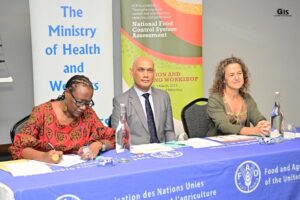
Mauritius: The Minister of Health and Wellness, Dr Kailesh Kumar Singh Jagutpal, launched today at the Caudan Arts Centre in Port Louis a five-day inception and training workshop on the project ‘Strengthening food control and phytosanitary capacities and governance’.
The workshop is organised by the Ministry of Agro-industry and Food Security and the Ministry of Health and Wellness in collaboration with the Food and Agriculture Organization of the United Nations (FAO).
The Acting United Nations (UN) Resident Coordinator for Mauritius and Seychelles, Ms Amanda Serumaga; the World Health Organization (WHO) Representative in Mauritius, Dr Anne Marie Ancia, and other personalities were present on this occasion.
This project foresees, among other activities, the implementation of a facilitated assessment of the national food control system, using the FAO/WHO food control system assessment tool in eight countries members of the African Union and, more specifically of the area of Common Market for Eastern and Southern Africa, including Mauritius.
The objective of this project is to provide technical support to the operationalisation of the Sanitary and Phytosanitary Policy Framework for Africa, enabling rational planning for the strengthening of national food control systems based on a rigorous evidence-based assessment of the internationally recognised good practice in the design and management of national food control systems. Under this framework, the FAO will facilitate the assessment of the national food control system of Mauritius by using the FAO/WHO Food Control System Assessment Tool.
In his keynote address, Minister Jagutpal recalled that on 04 July 2022, a new Food Bill was enacted to pave the way for the introduction of innovative and forthcoming measures regarding safe food of nutritive value, which, in addition to food safety standards like microbiological and chemical contaminants, will also set standards for the controls of trans-fatty acids, saturated fats, and salt in specific foods.
Another component of the food control system, the Minister underlined, is food control management which refers to the system of processes and procedures that are put in place to ensure the safety and nutritional quality of the food supply.
“Effective food control management involves a number of different elements, such as the establishment of clear standards and regulations that govern the production, distribution, and sale of food products,” he pointed out.

On this score, Dr Jagutpal indicated that in Mauritius, it is the Mauritius Food Standards Agency that shoulders these responsibilities and has been set up with the objective to harmonise the activities between all stakeholders across the whole food supply chain in order to ensure the safety and nutritional quality of food on the market.
Another important feature, he observed, is enforcement activities in the context of food control carried out by the Public Health and Food Safety Inspectorate of his Ministry.
“Enforcing compliance with food safety and nutritional quality standards is a critical part of our overall food control system which is why our enforcement activities are designed to ensure that all food products that are available to consumers meet the required standards,” the Health Minister said.
Dr Jagutpal further stressed that at the Government level, there are two main laboratories, namely, the Government Analyst Division for chemical analysis and physical examination; and the Central Health Laboratory for microbiological examination. “These laboratories provide a wide range of tests to assess the safety and nutritional quality of food products, including microbiological testing; chemical testing; physical testing; and nutritional analysis,” he stated.
These laboratories, the Health Minister remarked, play a critical role in investigating outbreaks of foodborne illness. “When an outbreak occurs, the Central Health Laboratory can be used to identify the specific pathogen responsible for the outbreak, to trace the source of the contamination and, to prevent further spread of the illness,” he indicated.
In addition, Minister Jagutpal underscored the importance of a strong food control system in order to ensure the safety and nutritional quality of the food supply. “Through the diligent efforts of Public Health and Food Safety Inspectors, laboratory technicians, government regulators, and other stakeholders in the food supply chain, we can ensure that the food we eat is safe and nutritious,” he emphasised.
He also appealed to consumers to acknowledge the role they play in promoting food safety and nutritional quality through the adoption of safe food handling practices, paying attention to food labels, and reporting any suspected cases of foodborne illness. “By continuously investing in and strengthening our food control systems, we can build a healthier nation with an enhanced quality of life,” the Health Minister said.
For her part, Ms Serumaga highlighted that the workshop marks the start of a project aimed at enhancing the food control system in Mauritius, adding that it is funded by the European Union to the tune of five million euros.
She underlined that the development of strong and effective national food control and phytosanitary systems is vital to ensuring the safety and well-being of citizens and complying with international trade standards.
Food Control, Ms Serumaga remarked, poses a significant challenge for Small Island Developing States due to their size and location, which exposes them to unique risks and vulnerabilities. “As Mauritius imports 77% of its food requirements, it has a higher exposure to external crises such as the current rise in food and energy prices caused by the conflict in Ukraine,” she pointed out.
In this context, the Acting UN Resident Coordinator stressed that this FAO/WHO Food Control System Assessment Tool will significantly help Mauritius as it has been designed to comprehensively assess the National Food Control System, and it examines the entire food chain from production, distribution, and the retail market to consumers.





